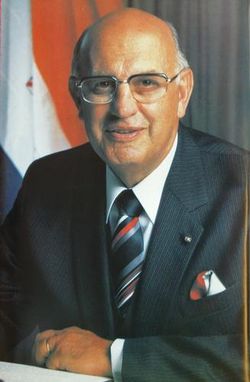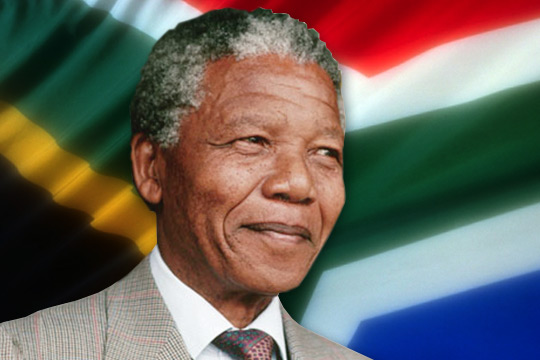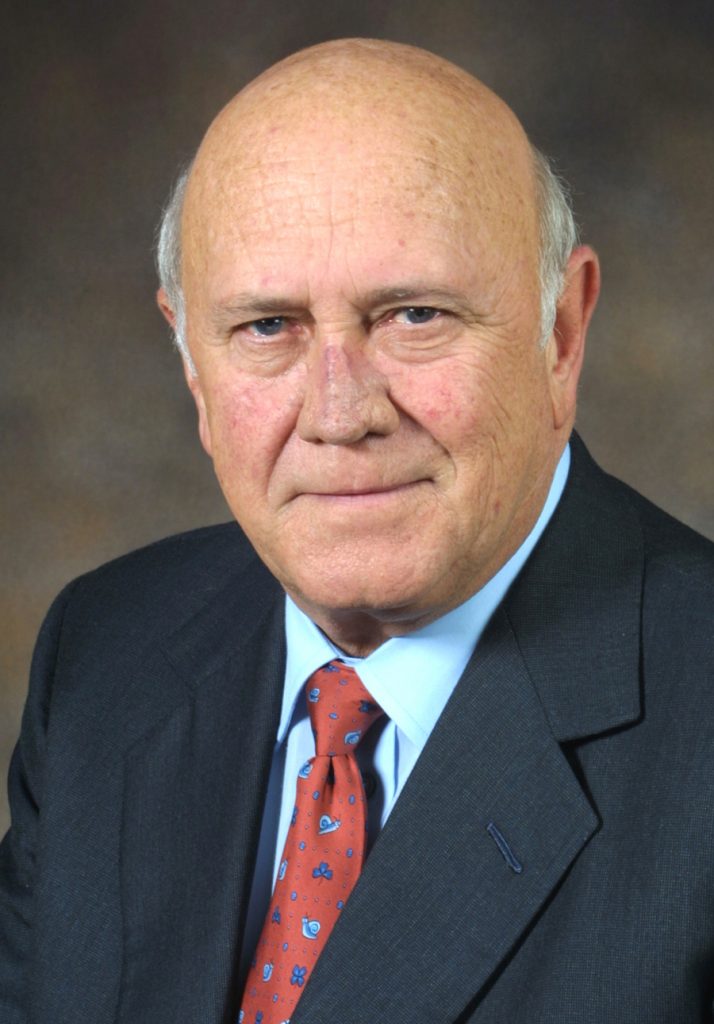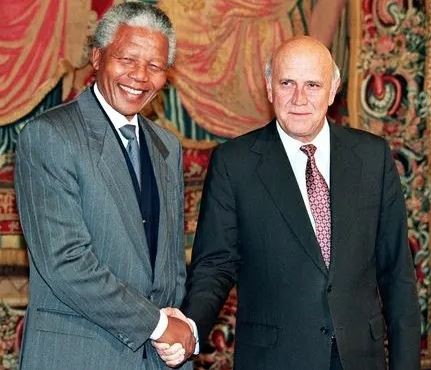South Africa
The Apartheid State: P. W. Botha

P. W. Botha
South African Transition: F. W. de Klerk
The New South Africa: Nelson Mandela

Nelson Mandela
South Africa’s Long March to Freedom: A Personal View
By Aubrey Immelman
Abstract
In this article I first offer a brief historical account of European white settlement, and ultimately political dominance, in southern Africa. Next, I outline how whites, and in particular Afrikaner-dominated National Party governments after 1948, achieved almost total subjugation of South Africa’s black majority through oppressive legislation and the calculated use of force. In that regard I enumerate some of the draconian laws enacted in the post-1948 apartheid state — laws that served as an impetus for black nationalism, anger, resistance, protest and, after 1960, armed struggle to achieve liberation from white oppression. Against this background, I examine salient factors accounting for South Africa’s relatively peaceful transition from apartheid state to nonracial democracy, focusing on situational variables as well as the personal characteristics of South African presidents P. W. Botha, F. W. de Klerk, and Nelson Mandela.
Citation
Immelman, A. (1994). South Africa’s long march to freedom: A personal view. The Saint John’s Symposium, 12, 1-20.

F. W. de Klerk and Nelson Mandela
By Aubrey Immelman
Abstract
The purpose of this paper is to examine salient factors accounting for South Africa’s relatively peaceful transition from apartheid state to nonracial democracy, focusing on the political personalities of South African leaders P. W. Botha, F. W. de Klerk, and Nelson Mandela. Following a brief overview of situational variables, the paper describes the political personalities of Mandela and De Klerk as assessed by the Millon-Type Political Personality Checklist (MPPC). The study shows that one cannot fully account for political developments in South Africa’s transition without considering (a) the interaction between situational variables and the political personalities of Nelson Mandela and F. W. de Klerk and (b) synergistic features in the personalities of these two leaders.
Citation
Immelman, A. (1994). South Africa in transition: The influence of the political personalities of Nelson Mandela and F. W. de Klerk. Paper presented at the 17th Annual Scientific Meeting of the International Society of Political Psychology, Santiago de Compostela, Galicia, Spain, July 11–14, 1994.
A different view of Mandela and De Klerk
A Millon-Based Study of Political Personality: Nelson Mandela and F. W. de Klerk
Part I: Method and Preliminary Results
By Aubrey Immelman
Abstract
This paper reports the method and preliminary findings of an investigation of the political personalities of South African president F. W. de Klerk and African National Congress president Nelson Mandela. The purpose of the study was to assess the utility of Theodore Millon’s personological model as an alternative or supplementary conceptual framework and methodology for the assessment of political personality. Conceptually, the investigation was conducted from the perspective of a model of personality compatible with Axis II of DSM-III-R, which serves as an important psychodiagnostic frame of reference for the practice of contemporary psychiatry and clinical psychology. Methodologically, the investigation involved personality appraisals at a distance, using an instrument adapted from the work of Millon and his associates.
Citation
Immelman, A. (1993). A Millon‑based study of political personality: Nelson Mandela and F. W. de Klerk. Part I: Method and preliminary results. Paper presented at the 16th Annual Scientific Meeting of the International Society of Political Psychology, Cambridge, MA, July 6–11, 1993.
A Millon-Based Study of Political Personality: Nelson Mandela and F. W. de Klerk
Part II: Further Results and Implications
By Aubrey Immelman
Abstract
This paper reports the results of a psychobiographical investigation, using the Millon-Type Political Personality Checklist, of the political personalities of outgoing South African president F. W. de Klerk and newly elected South African president Nelson Mandela, and examines the interactional influence of their respective personalities in facilitating South Africa’s transition from apartheid state to nonracial democracy.
Citation
Immelman, A. (1994, June). A Millon-based study of political personality: Nelson Mandela and F. W. de Klerk. Part II: Further results and implications. Unpublished manuscript.
Liberal Democracy, Good Governance and Competent Leadership
Opinion by Dennis Venter
Politicsweb
September 3, 2020
In recent times, “liberal democracy” and “liberalism” have come under concerted and increasing attack from various quarters, oftentimes laced with vitriol and misrepresentation. In America, the sycophants in the Republican Party and their idol, Donald Trump, have been responsible through outright lies, misinformation, fake-news and twitter gibberish to vilify the concept of liberal democracy, equating “liberalism” to “socialism.”
The egotistical, narcissist, reality-show host occupying the White House, who has spent his whole life wheeling and dealing in real estate and now masquerading as the 45th US President, is clearly out of his depth when it comes to these matters. Even more so, his constant fear-mongering to boost his re-election chances, as well as his divisive and inflammatory, often racist, rhetoric has put democracy in the US in mortal danger.
[…]
A psychometric study by the Unit for the Study of Personality in Politics at St. John’s University and the College of St. Benedict in Minnesota makes use of Aubrey Immelman’s Millon Inventory of Diagnostic Criteria [Note 1]. The study finds that many leaders suffer from what is known as a “bureaucratic-compulsive syndrome” [Note 2]. Leaders with this syndrome are noted for their “officious, high-handed bearing; intrusive, meddlesome interpersonal conduct; unimaginative, closed-minded cognitive style; and grim, imperturbable mood.” And, over time, they “become more and more dogmatic (self-righteous and impervious to correction), inflexible (thick-skinned and vengeful), and paranoid (increasingly suspicious).”
If one looks at all these characteristics, it should be easy to conclude that Donald Trump “has not a single redeeming defect” — as Benjamin Disraeli so aptly said of William Gladstone many decades ago. Trump is the epitome of arrogance — observe the facial expressions, the body language, the demagoguery.
[…]
The author holds a doctorate in Political Science from the University of South Africa (Unisa) in Pretoria. He is a former Executive Director of the Africa Institute of South Africa, and Nelson Mandela Chair Professor in the Centre for African Studies, School of International Studies, Jawaharlal Nehru University (JNU) in New Delhi, India. He is retired and lives in Pretoria but is still academically active.
Note 1: The published article incorrectly identifies the Unit for the Study of Personality in Politics as being associated with the University of Minnesota and attributes the psychometric instrument to Theodore Millon. Those errors have been corrected in the above excerpt from the article.
Note 2: A 2001 study conducted at the Unit for the Study of Personality in Politics found that Zimbabwe’s Robert Mugabe fit the “bureaucratic compulsive” profile; however, the syndrome has not been identified in U.S. presidents studied since 1996. President Donald Trump was described as a “high-dominance charismatic” (2016) and an “aggressive, impulsive, unprincipled narcissist” (2020)













Follow Aubrey Immelman